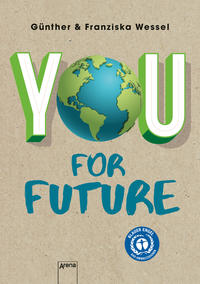Your Search Results
-
Promoted ContentChildren's & YA
You for Future
by Franziska Wessel/ Günther Wessel
‘We will not stop demonstrating,’ writes Franziska Wessel in a guest column in the Berliner Zeitung. Franziska is pursuing a goal. Decisive measures must finally be taken to protect the climate. While that is not happening she spends every Friday on the streets, gives interviews and puts pressure on politicians. But climate change isn’t the only thing threatening our future. There is so much suffering, injustice and destruction in the world. Something must be done about it. And as a climate activist, Franziska knows exactly how to be active. Together with her father, the journalist and author, Günther Wessel, she explains: How do I start a petition? How do I organise a campaign? How does lobbying work? So that everyone knows how they can make things happen.
-
Promoted ContentFebruary 2024
Why We Should Care if a Sack of RiceFalls Over in China
The food of the future
by Dr. Malte Rubach
It is time to counter the numerous utopias, myths and established narratives of the future of nutrition with a fact-based scenario. This book shows where the natural limits of what is currently technologically feasible lie and how the global diversity of food cultures will ensure the survival of humanity in the future. It exposes the great promises of meat substitutes from the laboratory as well as vegan renunciation scenarios, and shows a realistic path for the future of global nutrition along the lines of the United Nations’ 17 Sustainable Development Goals.
-
 Trusted Partner
Trusted Partner
-
 Trusted Partner
November 2021
Trusted Partner
November 2021The Forest of the Future – A New Reality
Understanding the ecosystem
by Hans Jürgen Böhmer
What happened with forest dieback? The predictions of the 1980s that forests would be in decline across Europe have not come true. Currently, attention again focuses on the doom scenarios of the loss of entire forests and cultural landscapes in an emotional and sometimes hysterical debate. Biogeographer Hans Jürgen Böhmer refers to updated case studies and his 30 years of research experience on global ecosystems to demonstrate extremely complex interrelations of the natural world that various actors monitor in contrasting ways and characterized by different times and ideologies. Böhmer advocates to embed the sustainability debate more strongly in the living environment, rather than relying exclusively on model calculations.
-
 Trusted Partner
Trusted Partner
-
 Trusted Partner
Trusted Partner
-
 Trusted Partner
March 2024
Trusted Partner
March 2024Future Family
Familien am Limit - neue Impulse für mehr Vereinbarkeit
by Hoffmeister, Ana
-
 Trusted Partner
May 2017
Trusted Partner
May 2017Future Sex
Wie wir heute lieben. Ein Selbstversuch
by Emily Witt, Hannes Meyer
Emily Witts Prognose für die weibliche Sexualität lautet: selbstbewusst, frei und unerschrocken. Mit einem wachen Blick, großer Begeisterungsfähigkeit und einer außergewöhnlichen Beobachtungsgabe erforscht die New Yorker Journalistin die neuen Formen weiblicher Sexualität, von Tinder über Feminist Porn bis hin zur Orgasmic Meditation. Emily Witt ist Mitte dreißig, Single und lebt in Brooklyn. Die ideale Voraussetzung für ein bewegtes Liebes- und Sexleben. Könnte man meinen. Doch eigentlich hat auch Witt trotz all der schillernden Angebote ein ganz bestimmtes Ziel im Visier: Ehemann, Kinder und ein Eigenheim. Um die Möglichkeitswelt jenseits der tradierten Ideale zu erkunden, entschließt sich die Journalistin zu einer Reise nach San Francisco, der Hochburg der freien Liebe und der digitalen wie libidinösen Zukunft. Sie durchstreift die Sphären des Internetdatings, feiert auf einer Hochzeit von Polyamoristen, spricht mit der Königin eines feministischen Kinky-Porn-Unternehmens, sie sondiert und überschreitet ihre eigenen Grenzen bei dem legendären Exzessfestival »Burning Man« und begibt sich ins Zentrum der »Orgasmic Meditation«. Am Ende ihrer Reise steht eine überraschende Erkenntnis.
-
 Trusted Partner
Trusted Partner
-
 Trusted Partner
Trusted Partner
-
 Trusted Partner
August 2021
Trusted Partner
August 2021Europe for Future
95 Thesen, die Europa retten – was jetzt geschehen muss (Das europäische Manifest im Wahljahr 2021)
by Herr, Vincent-Immanuel & Speer, Martin
-
 Trusted Partner
September 2018
Trusted Partner
September 2018The Past, Present, and Future of Tontines.
A Seventeenth Century Financial Product and the Development of Life Insurance.
by Herausgegeben von Hellwege, Phillip
-
 Trusted Partner
October 2024
Trusted Partner
October 2024Renunciation and Freedom
Survivial in the future
by Jean-Pierre Wils
The situation in our society is precarious. The ecological shocks are omnipresent. The mere continuation of our lifestyles fixated on expansion and self-development has long since reached its limits. As if intoxicated by ourselves, we consume our world voraciously and without restraint. We need moderation and frugality that lead us out of the ecological and social dead ends and hold both the individual and Politics to account. We are by no means powerless and are perfectly capable of leading a life that offers prospects for a humane future. However, our idea of freedom needs urgent correction. For this endeavour to succeed, we need the courage to face reality and the willingness, in a spirit of solidarity, to say goodbye to a false life and join the alliance of renunciation and freedom. Then we will be free – differently and better.
-
 Trusted Partner
Humanities & Social SciencesFebruary 2026
Trusted Partner
Humanities & Social SciencesFebruary 2026Future perfect
An imaginative ethnography of Mediterranean illegalised migration
by Alexandra D'Onofrio
The present volume emerges from a practice-based research that focuses on experiences of migration and border crossing during what are perceived as existential 'turning points' by the protagonists themselves. It recognizes the fundamental role that imagination plays in people's perceptions of reality, in their decisions and actions, and finally in the way they narrate their experiences. As a consequence, it makes a stance for ethnographic practice to include more creative and collaborative methodologies in order to explore such intangible and unstructured realms of existence. In particular, this ethnography developed theoretically and methodologically in close collaboration with a group of Egyptian men who crossed the Mediterranean Sea in search of better living opportunities in Italy, by engaging them through a range of the co-creative processes such as theatre improvisations, storytelling practices, collaborative filmmaking and participatory animation.
-
 Trusted Partner
Trusted Partner
-
 Trusted Partner
Trusted Partner
-
 Trusted Partner
July 2022
Trusted Partner
July 2022Digital Competence and Future Skills
How companies prepare themselves for the digital future
by Ramin, Philipp
-
 Trusted Partner
Humanities & Social SciencesNovember 2010
Trusted Partner
Humanities & Social SciencesNovember 2010Globalisation, Integration and the Future of European Welfare States
by Theodora-Ismene Gizelis, Emil Kirchner, Thomas Christiansen
This book argues that the welfare state cannot be understood purely as a set of social policy arrangements, but must be seen as a political institution, intended to achieve certain political objectives. The political dimension of the welfare state is essential for understanding its initial emergence as well as assessing its ability to deal with contemporary challenges. Governments use welfare transfers to decrease the risk of political instability that may be politically disruptive and threaten to undermine social cohesion. The success of welfare institutions stems from their ability to foster a redistribution of resources and political consensus that has enabled long-term political stability and economic development. The book develops a general model that looks at the interactive effects between welfare transfers, political instability and state capacity. It provides a unique theoretical contribution to the study of welfare spending in the context of globalisation and integration, analyses the key politial rationale for welfare programmes, namely their role in preserving social cohesion and governance and demonstrates clearly that welfare policies can be successfully adopted to meet new challenges and that retrenchment of the welfare state is not inevitable, using Scandinavia as a leading example of modern thinking policies. ;
-
 Trusted Partner
Trusted Partner
-
 Trusted Partner
Trusted Partner



































